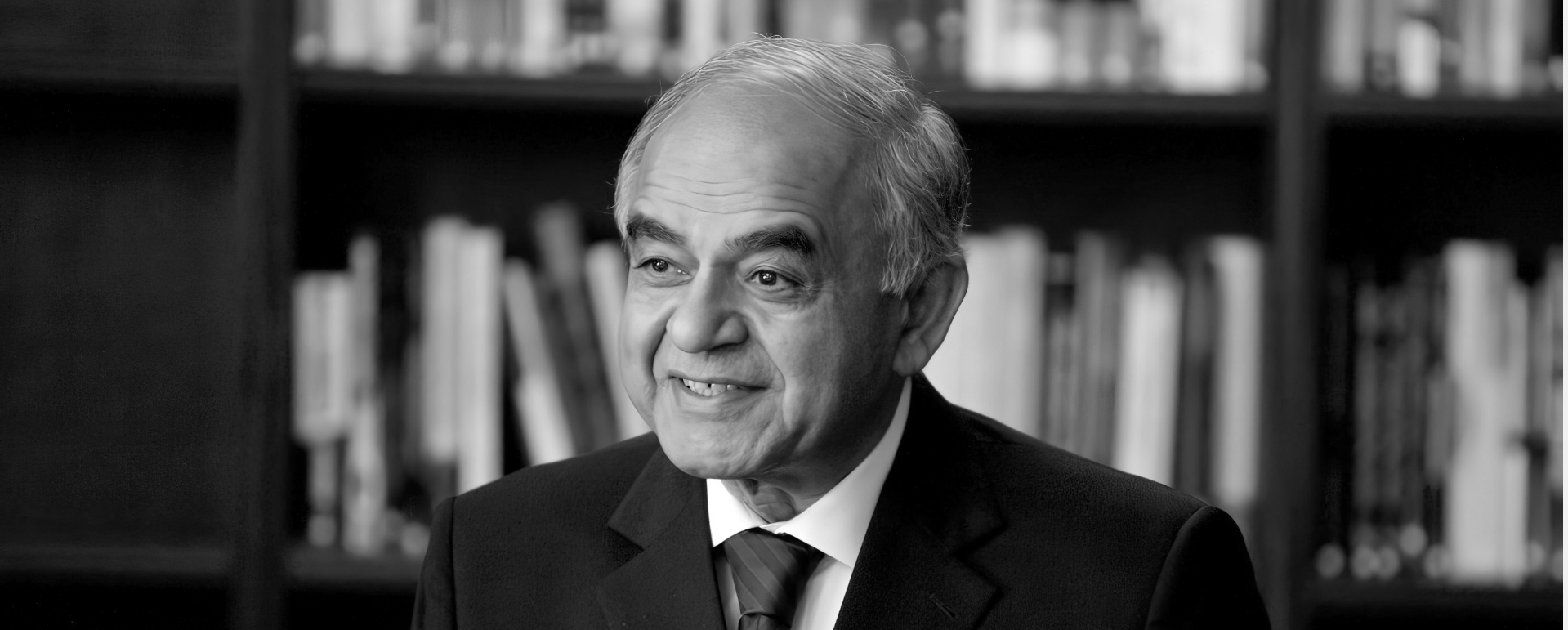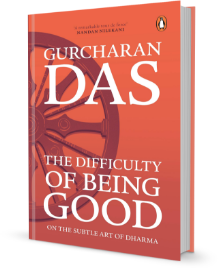

The Difficulty of Being Good: On the Subtle Art of Dharma
-
1) "Das's deeply informed and learned musings on The Mahabharata and its moral dilemmas are invariably penetrating and full of insight, and the questions he raises so important…highly personal and idiosyncratic, yet richly insightful meditation on the application of ancient philosophy to issues of modern moral conduct and right and wrong."
--The Financial Times (William Dalrymple), September 26, 2010. -
2) "Gurcharan Das is a multi-talented man. He has been a successful business leader, an author of plays and novels and the book India Unbound, which told the world that India had arrived. Now he has taken on the difficult task of reading the Mahabharata and interpreting its many messages in light of contemporary circumstances…The result is a book rich in ideas. Das does not retell the story as has often been done. He takes episodes and characters who pose moral and ethical questions. …He has given us a cosmopolitan study of a quintessentially Indian text. The central question concerns dharma and its changing meanings as attributed by the characters in the epic and the way we would think of dharma today.
--Indian Express Sept 12, 2009 (by Lord Meghnad Desai), -
3) 'Gurcharan Das is without doubt the most erudite CEO…. His book India Unbound captured the change in post-liberalisation India. It echoed our hopes for a new India. In The Difficulty of Being Good, Gurcharan voices our despair about inequities and the amorality of public life. This book reveals a new Gurcharan. Reflective, humane, deeply spiritual and secular—a renaissance man…. What is truly appealing about Gurcharan's contemporaneous reading of the Mahabharata is his reinforcement of liberal values. The epic's wisdom empowers the individual and shows us the way forward in dealing with daily challenges…Despite its moral ambiguity, it shows how one can act righteously in an amoral world…He draws from his own life and the lessons he has learned. He reflects on his decision to call it quits, as CEO of Procter & Gamble India, at the early age of 50 and live his vanaprasthya as a writer. We must thank him for his wisdom in making that choice, for we are today the true beneficiaries of his personal decision.'
--Outlook Magazine ( by Sanjay Baru), New Delhi, 28 Sept 2009 -
4) "This book is sure to find followers among businessmen, corporate professionals and maybe even political leaders, all of whom seek to find a code of ethics that justifies their actions and who would be delighted to find an indigenous paradigm that allows for a contextual good rather than a categorical imperative… Here is a man in the shadowed afternoon of a life well-lived, now in a stage of quiet of self-reflection when one looks back on what one has done and achieved and wonders about what lies ahead, what might happen next. For all of these reasons, Das is a thoughtful and compassionate guide through the territory that he defines and treads. He wields a confident machete that cuts through the tangles of ancient brush and the over-grown and self-congratulatory contemporary elephant grasses that cover the path towards clear-eyed ethical action… Das uses stories from the ancient text as parables to understand the world we live in and the people that we are surrounded by. The project he undertakes is as much about mining the past for wisdom as it is about parsing the present such that we can make sense of it. He uses the characters and the situations of the Mahabharata as a grammar through which we might tease meaning out of recent public scandals that ask the question, was this the right thing to do or, how could he have done this?…Das has the courage to seek a moral centre within the great text that is human rather than divine.'
-- The Book Review (Arshia Sattar), New Delhi, 2010 -
5) "In his dual capacity as a pundit and a littérateur, Das could hardly have chosen a more relevant filter for the ethical questions before India in a time of galloping growth, explosive conflict and dizzying change. Das uses the Mahabharata to trigger his reflections on everything from corporate corruption scandals and Ponzi schemes, to affirmative action and reforms in higher education; from the future of Gandhian resistance to the fate of tribal communities in the face of rampant development; from the quarrels of industrialists to the personalities of politicians. Sometimes he takes a detour through American history, German social theory, Greek philosophy and English literature; at other times, he recalls moments from his own life and career in India. The book's subtitle, On The Subtle Art of Dharma, takes us to the heart of the epic's subject matter… When Barack Obama had to decide whether to send additional troops to Afghanistan, and if so then how many, he grappled with a problem of dharma… When developed countries do not take steps to address the climate change that their technologies have precipitated, theirs is a failure of dharma… Places such as Gaza and the West Bank, where conflicting moral claims give rise to violent military engagements, are theatres of dharma…But when my friend must decide whether to keep his dying parent on life-support, that too is an engagement with dharma. It is clear that the term is complex and capacious, enfolding everything from "right" to "norm" to "law" to "duty" to "injunction" to "righteousness"."
-- The National (Ananya Vajpayee), Dec 24, 2009. -
6) "Through a series of bravura readings of the Mahabharata, Gurcharan Das makes a learned and passionate attempt to inform how the great Indian epic might illuminate our present-day moral dilemmas. Readers will find his analyses of dharma insightful, challenging, and honest--doing full justice to the world's most complex, exciting and honest poem. This admirable book offers precisely the kind of reflection that the epic itself invites—moral, political and public. It shows why the Mahabharata is a classic: because it is ever timely. This superb book is knowledgeable, passionate, and even courageous. Grounded in a secure knowledge of the narrative, it raises key moral problems—from the doctrine of just war to affirmative action to the nature of suffering-- and it makes striking attempts to link these with contemporary discussions and issues, both public and personal."
--Sheldon Pollock, Professor of Sanskrit and Indian Studies, Columbia University -
7) "This wise, passionate, and illuminating book is one of the best things I've read about the contribution of great literature to ethical thought…How can we live with moral balance in an arbitrary and uncertain world? In this wise, passionate, and illuminating book, Gurcharan Das turns to the classical Indian epic Mahabharata for answers -- and finds, instead, a life of questioning, an ethical temper tolerant and suspicious of ideology, in which certainty is no virtue and respect for the projects of others is the appropriate response to life's complexities."
--Martha Nussbaum, Professor of Philosophy, University of Chicago -
8)"I was very moved by this richly articulated, contemporary meditation on the Mahabharata and the great human themes it embodies-- above all the question of what life means and what one might do to endow it with purpose, within the inherently ambiguous and painful contexts in which we always find ourselves. The book is a kind of miracle: a deeply sensitive man suddenly decides to leave his usual routines and familiar roles and to spend some years simply reading the Mahabharata and seeing what the ancient epic has to tell him; he engages profoundly with the text, with the bewildering profusion of its messages, its tormented heroes, and the dramatic events it describes; and he then finds the space and the right words for a thoughtful, highly personal, philosophically informed, skeptical, sustained response. Such things happen only rarely in our generation, and we should all be grateful to Gurcharan Das for this gift.'
--David Shulman, Professor of Humanistic Studies, The Hebrew University of Jerusalem. -
9) "This book is a triple treat. It provides a subtle reading of episodes in the Mahabharata. It uses those readings to raise consistently provocative questions about the character of dharma. And it addresses important questions about the character of our ethical lives…It wears its learning lightly, prompting one to think, and hence it is a pleasure and a provocation."
--Pratap Bhanu Mehta, political scientist and president, Centre for Policy Research, New Delhi -
10) "The book is a wonderful combination of the scholarly and the personal, the academic and the meditative. The basic plan works beautifully, building a rich mix of his very, very careful and detailed reading of the text, his other wide reading, and his life in business; an extraordinary blend. I found the use of evolutionary biology and the Prisoner's Dilemma to explain the pragmatism of the Mahabharata absolutely brilliant."
--Wendy Doniger, Professor of the History of Religions, University of Chicago. -
11)'Gurcharan Das' personal search for dharma in the ancient epic uncovers buried signposts to a desirable future polity. The Difficulty of Being Good is a significant Indian contribution to a new, universal Enlightenment that is not Western in origin or character. It is a delight to read a book that wears its learning so elegantly and presents its arguments with such panache.'
--Sudhir Kakar, author and psychoanalyst -
12) "If US President Barack Obama had listened to Yudhishthira, the eldest of the Pandavas in Mahabharata, he would not have behaved the way he did when he had to deal with the greed and indiscretion of America's top investment bankers. Obama had sought a legal way to claw back the bonuses these executives had showered themselves with even as the institutions they headed were going bust. But this is not what Obama should have asked for, argues Gurcharan Das in this book. "To want to punish someone in this crisis was understandable but it was a dangerous path. What the world needed instead was the calm and principled voice of a Yudhishthira. In Obama's place he would have appealed for a 'voluntary' return of bonuses while explaining to the American people that Wall Street had been bailed out to save Main Street's pain and honoring bonus contracts was necessary to the rule of law," he explains. If you conclude from this that Dharma means to remain calm, follow principles and honor the rule of law, Das will accuse you of over-simplifying Dharma."
-- Business Standard, New Delhi, Sept 17, 2009. -
13) "This tale of a family in crisis is a metaphor in Das's book for the economic upheavals that have engulfed the world…Investment bankers on Wall Street suffered from similar moral infirmities as the heroes in the Mahabharata; they exposed the flaws in the global capitalist system… Are lessons from the Mahabharata enough to save capitalism? Das, certainly, thinks that a healthy dose of Dharma may restore trust in the system. Das's book (even though it is not really a translation) will certainly make it accessible to a whole new generation."
--Hindustan Times, New Delhi, September 11, 2009 -
14) "Das, in his magnificent new book, seamlessly blends the personal and the scholarly, the academic and the meditative, to brilliantly explain the pragmatism of a classic."
--Economic Times, Mumbai, Oct 15 2009.
